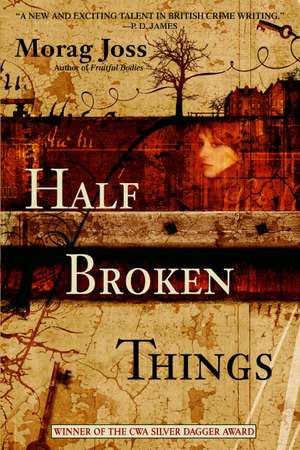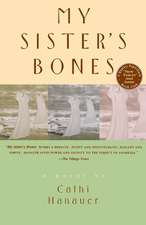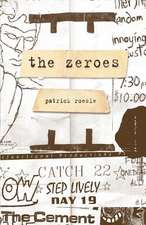Half Broken Things
Autor Morag Jossen Limba Engleză Paperback – 30 iun 2006
Vezi toate premiile Carte premiată
Dilys Award (2006)
Jean is a house sitter at the end of a dreary career. Steph is nine months pregnant and on the run. And Michael is a thief. Through a mixture of deceit, good luck, and misfortune, these three damaged loners have come together at a secluded country home called Walden Manor. Now all three have found what they needed most: a new beginning, a little kindness, a little love. Living off the manor’s riches, tending its grounds and gardens, they leave the outside world far behind and build a happiness so long denied them. That is, until the first unexpected visitor arrives...igniting a chain reaction that is at once spellbinding and disastrous.
A stunning, thought-provoking crime novel of chilling moral complexity, Half Broken Things is a gripping, haunting exploration of love and our need for it, of the damage done when we go long without it, and the deeds we might be driven to in its name.
From the Hardcover edition.
Preț: 111.01 lei
Nou
Puncte Express: 167
Preț estimativ în valută:
21.24€ • 22.71$ • 17.71£
21.24€ • 22.71$ • 17.71£
Carte disponibilă
Livrare economică 28 martie-11 aprilie
Preluare comenzi: 021 569.72.76
Specificații
ISBN-13: 9780440242444
ISBN-10: 0440242444
Pagini: 303
Dimensiuni: 160 x 227 x 19 mm
Greutate: 0.33 kg
Editura: DELTA
ISBN-10: 0440242444
Pagini: 303
Dimensiuni: 160 x 227 x 19 mm
Greutate: 0.33 kg
Editura: DELTA
Notă biografică
Morag Joss grew up on the west coast of Scotland. Her first Sara Selkirk novel, Funeral Music, was nominated by the Independent Mystery Booksellers Association for the Dilys Award for the year’s favorite mystery. Her fourth novel, Half Broken Things, won the 2003 CWA Silver Dagger Award. Morag Joss lives in the country outside the city of Bath and in London.
From the Paperback edition.
From the Paperback edition.
Extras
January
Walden Manor August
This is not what it might look like. We’re quiet people. As a general rule extraordinary things do not happen to us, and we are not the type to go looking for them. But so much has happened since January, and I started it. Things began to happen, things I must have brought about somehow without quite foreseeing where they would lead. So I feel I must explain, late in the day though it is. I’m going to set out, as clearly as I can, in the order in which they occurred, the things that have happened here. And I shall find it difficult because I was brought up not to draw attention to myself and I’ve never been considered a forthcoming person, never being one to splurge out on anything, least of all great long explanations. Indeed, Mother always described me as secretive. But that was because, with her, I came to expect my reasons for things to be not so much misunderstood as overlooked or mislaid, and so early on I stopped giving them.
Father was usually quiet, too. When I think back to the sounds of the house in Oakfield Avenue where I grew up, I do not remember voices. I think we sighed or cleared our throats more often than we spoke words. I remember mainly the tick of Father’s longcase clock in the dining room we never ate in, and then after the clock had gone, a particular silence throughout the house that I thought of as a shade of grey. And much later when I was an adult, still there looking after Mother, the most regular sound was the microwave. It pinged a dozen times a day. In fact, until recently, whenever I heard a certain tone of ping, in a shop or somewhere like that, I would immediately smell boiling milk. But when I was a child there was just the clock, with silences in between.
Mother had few words herself. She often went about the house as if she were harbouring unsaid things at great personal cost, with a locked look on her mouth. That being so, I suppose Father and I felt unable to open our own mouths very much. What happens to all the things you might say or want to say, but don’t? Well, they don’t lie about in your head indefinitely, waiting to be let out. For a time they may stay there quite patiently, but then they shuffle off and fade until you can’t locate them any more, and you realise they’re not coming back. By then you’re past caring.
So I grew to think of myself as someone not in particular need of words. I did not acquire the habit of calling them up; not many at a time at least, not even to myself in my own head. Things in my head had been very quiet for a long time, before all this.
But I have been wrong about this aspect of myself, as about others. I find that there are words there after all. Now that I need them, my words have come crowding back, perhaps because I have a limited time in which to get them all down (today is the 20th, so only eleven more days). I am pleased that my hands remember the old touch-typing moves without seeming to involve me at all. The letters are hitting the paper in this old typewriter almost as if they were being shot out of my finger-ends. Which is just as well, because I’m busy enough dealing with all the clamouring words that are flinging themselves around in my head, fighting over which gets fired out first. I’m in a hurry to let them loose. I want to explain, because it is suddenly extremely urgent and important that, in the end, we are not misunderstood.
And I shall try to put down not just what, but why things have happened and why none of it could have turned out any differently. Until now I really haven’t thought about the why. Time’s the thing. I haven’t had time, not time of the right kind, to ask myself why things have gone the way they have. I’ve been too busy being happy; even now I’m happy, although the time left is of the other kind. But I’m quite content to spend it trying to puzzle it all out and write it down. It’s a pleasant way to pass time, sitting over the typewriter at the study window and looking out now and then to wave at them (that’s Michael, Steph and Charlie) down there in the garden. They’re not doing much. Steph is singing to Charlie and rocking him on her lap: ‘Row, row, row the boat’—that’s one of Charlie’s favourites—and the more she rocks the more he likes it. They’re waving back now. I’ve told them I’ve got to write a report for the agency and in a way, that’s almost true, so they’re making pretend-sad faces up at me because I can’t spend the afternoon with them. And now Steph’s got hold of Charlie’s wrist and she’s making him wave too. Behind them, I can see three different kinds of Michaelmas daisy in the border, three nice shades of purple. But the roses are on their second flowering now and look as if the air’s gone out of them, as if they’ve stayed too long at the party.
Anyway, I’m going off the point. I was saying that I’m going to explain everything. And while I cannot imagine any explanation for anything that does not also contain an element of justification, I am not trying to offer excuses for what we have done. But nor am I apologising, quite, except for the mess and inconvenience, which are bound to be considerable.
So how did it start? With the letter from the agency? Or with the advertisement I placed? Perhaps much earlier, years and years ago, with Jenny. Jenny is the niece I invented for myself. Yes, perhaps that reveals a tendency. She started as just a little harmless face-saving white lie which of course led to others, and in no time at all the fact that she did not exist was neither here nor there. My niece became quite real to me, or as real as somebody living in Australia ever could be, in my mind. I haven’t travelled abroad.
No, now that I reflect, it started with this place, with the house itself. Because the house made me feel things from the very first which perhaps I should find strange, it being my fifty-eighth. Memories are a little blurred after fifty-seven in eighteen years, but I do know I’d never felt things before. This is the fifty-eighth house, although I’ve sat some houses more than once because people used to ask for me again. I specialise, or I did, in long stays. ‘We have the perfect lady, flexible, no ties, usually available’ was how I was recommended. I spell this out just so that it is clear that I have been well thought of. Inexperience has nothing to do with it. Nor was it anything to do with malice or jealousy.
The house when I came was full of old things; fuller than it is now, for reasons I will come to. Many of them were not in mint condition, and I liked them like that. I liked the way they sat about the house in little settlements, as if they had sought one another out and were sticking together, little colonies of things on small island table tops. There were the boxes: workboxes with velvet linings and silver spools and scissors and dear little buttonhooks, boxes with tiny glass bottles with stoppers missing, writing boxes still cedar scented and ink-stained on the inside, yellowed carved ivory boxes, and painted and enamel ones—I suppose for snuff, those ones—but I wasn’t concerned about their original purpose. Then there were the small silver things in the drawing room, the heavy paper knife with a swan’s head, the magnifying glass, a round box with a dent, the filigree basket with the twisted handle, a vase for a single rose. The blue and white porcelain in the dining room, some of it chipped, and the fans in the case in the library, of beaded lace, faded painted parchment and tired-looking feathers. Even some of the books: nearly everything else was modern, but on three shelves there were sets of very old books with cracked spines and faint titles. They all had that look of being dusted in cinnamon and gave off a leafy smell that reminded me of church. Inside, many of the pages were loose, and so thin that the print on the other side grinned right through the words when I tried to read, as if they were not unreadable enough already.
But all these things seemed content in their imperfections; they were not shouting out to be mended the way new things are. New things so often break before there has been time for them to fade and crumble. Here, it was as if the things had simply been around long enough to be dropped or bent or knocked, and every one of these minute, accidental events had been patiently absorbed, as if the things knew themselves to be acceptable and thought beautiful just as they were. If objects could give contented sighs, that’s what these would have done. I wanted to be like that. I wondered if I, also fading and crumbling as everything does in the end, could be like that. Yes, I remember wondering that right from the start, in those first few days of January.
The third day, like the first two, slipped away and got lost somewhere in the folds of the afternoon. As before, Jean had made the dusting of the objects in the house last for most of the morning. She had vacuumed the floors again and cleaned her bathroom, unnecessarily. After her lunch of milky instant coffee and biscuits she tidied round the kitchen. When she could fool herself no longer that there was anything left to do she mounted the carved wooden stairs and walked the upper floors, again feeling mildly inquisitive, as if the house and the rest of the day might be conspiring to withhold something from her. Again, pointlessly, she tried the three doors she knew to be locked. Then she wandered with less purpose, pausing here and there, her vague eyes watching how light displaced time in the many other rooms of the house. Light entered by the mullioned windows, stretched over floors and panelled walls and lay down across empty beds. It lay as cold and silent as a held breath over furniture and objects and over Jean lingering in each doorway; it claimed space usually taken by hours and minutes which, outside, continued to pass. Through windows to the west Jean saw how the wind was moving the bare trees that bordered the fields; through the south windows she watched grass shivering in the paddock, watched as clouds pasted onto the sky bulged and heaved a little. Inside, the afternoon aged; its folds sank and deepened, closed over the last of the daylight and sucked it in. When it was quite dark Jean walked again from room to room, touching things gently and drawing curtains. So the third day passed, with Jean watching as it seemed not to do so, unaware that she was waiting.
She was keeping the letter from the agency in the pocket of her thick new cardigan, the Christmas present she had bought and wrapped for herself so that she would have something to open ‘from my niece Jenny in Australia’ in front of the other residents on Christmas morning. For this year, finding herself again be- tween house-sitting jobs over the holiday, she had been obliged to spend Christmas at the Ardenleigh Guest House. It was Jean’s fifth Christmas there in eighteen years, and Jenny had sprung into being the very first time when, one day at breakfast, a depressed old lady had invited Jean to agree with her that Christmas was quite dreadful when you were getting on and nobody wanted you. It had sounded like an accusation; Jean had then been in her late forties but suspected she looked older. She ignored the assumption about her age and concentrated on the ‘unwanted’ allegation. She heard herself saying, Oh, but I didn’t have to come here! In fact my . . . my niece begged me to come to her! But I told her oh no, I shan’t come this year, thank you, dear. Thank you, Jenny dear, I said, but no, I’ll make other arrangements. And then of course the old lady had asked her why. Oh, well. Well, she’s having a baby soon, her third. So I thought, it wouldn’t be fair to add to the workload this year. Then she added, in a voice loaded with dread, You see, she’s not having an easy pregnancy.
Several of the residents were permanent, and the next time Jean had to spend Christmas there one of them asked, too eagerly, how the niece was getting on. She could not bear to disappoint—it was as if during the intervening two years the residents had been on the edge of their seats waiting for news—so she found herself telling them about the baby (quite a toddler now, into everything!), adding that this year they were away, spending Christmas with Jenny’s husband’s family. And it was the same the next time, at which point Jean lost her nerve and packed them all off to live in Australia. But she discovered that the Ardenleigh residents had formed a high opinion of Jenny, and it did not seem right to Jean to sully her niece’s reputation by allowing her, just because she had emigrated, to forget her old aunt in England. It did not seem the kind of thing Jenny would do. So for Ardenleigh Christmases she now produced Jenny’s thoughtful present, relieved not to have to produce also another reason, beyond the unbearably long flight (at her age), for not spending Christmas ‘Down Under’.
But this year it seemed that Jenny had slipped up, because the cardigan was not a success. Jean had chosen it thinking its colour ‘amethyst’ and realised, now that it had been hers for over a week, that it was just a muddy purple. But it did not occur to her not to wear it even though it now disappointed; she wrapped herself snugly into her mistake just as she kept the letter close as a reminder to be at all times braced against the temptation to forget it. It lay in her cardigan pocket. In the mornings, bending to dust the feet of a table or to unplug the vacuum cleaner, Jean would sometimes feel it crackle next to her, as if a small, sharp part of herself had broken off and was hanging loose against her side. It puzzled her, almost, to find that she was not actually in pain. Sometimes she would take the envelope from her pocket and look at it, but she did not read the letter again.
Yet, somewhere in the course of the afternoons, Jean would arrive at an amnesty with the presence of the letter. As daylight took its leave, it seemed to wrap up and bear away the threat that seeped from her cardigan pocket. She could feel that the letter itself was still there, but she would begin to regard it with a sort of detached astonishment, which grew into simple disbelief that marks on a piece of paper should hold any power over her. Walking from room to room, switching on lamps, it seemed amazing to her that only this morning she had thought the letter had any meaning at all. Here, in this soft lamplight, how could it? And as the day darkened further, the picture of herself accepting some pointless words in an envelope hidden inside her cardigan grew more and more improbable. By night time, when she had settled at the drawing-room fire and the peace of the house was at its deepest, the very notion of eight months hence was simply incredible. Here, if she wanted it, the future could be as dim and distant as she preferred the past to be.
On the fourth day Shelley from the agency telephoned.
‘Hello?’
‘Is that Walden Manor?’
‘Yes? Hello?’
‘Who is this? Jean, is that you? Jean? It’s Shelley, from Town and Country Sitters. Did you get our letter?’
‘Oh. Oh yes. Yes, I got the letter.’
Jean disliked Shelley. She had met her in person only once, when a householder had insisted that his keys should not be sent through the post to the sitter and Jean had had to travel to the office in Stockport to collect them. She knew she ought to try to feel sorry for her. Shelley was burdened both by asthma and by a disproportionately large chest, which together gave the impression that her breasts were actually two hardworking outside lungs, round and wide, inelastic and over-inflated. Jean now pictured them rising and falling and pulled her purple cardigan round her own neat shoulders, swaying in a wave of panic that suddenly washed through her. She waited with the receiver held some distance away, trying to calm herself, while Shelley caught her breath at the other end. She guessed that Shelley would be at her desk, winding the telephone flex around the ringed index finger of her free hand, her unbuttoned jacket of the navy businesswoman sort skimming the sides of her blouse-clad bosom with the whish and crackle of acetate meeting acetate. Possibly this was adding to the gusts of noise that Jean could hear over the phone, now, as if some battle that she could not see were being fought somewhere in the distance.
‘Right, well, Jean,’ Shelley managed at last, ‘so you’ve had our confirmation. Basically I just wanted to check if you’ve got any queries. You’re okay as regards the contents of the letter, are you? Unfortunately we won’t be in a position to offer you any further employment after the expiry of this current contract. I mean, we had said, hadn’t we. I did say.’
Jean said nothing, knowing that her silence would be considered a difficult one.
Shelley told her, ‘We don’t like terminating people but it’s company policy. Town and Country’s not in a position to keep people on past retirement age, we’re not allowed. It’s the insurance.’ Breathing of a struggling, bovine kind followed this long speech. ‘I mean, you’ve done sterling work. But you’ve already had four years past sixty. Right. So.’
Still Jean said nothing, so Shelley changed tack. ‘So, you’re doing okay, are you, Jean, as regards the location of the property? Okay popping out and getting your bits and pieces? Because they did say it’d be better for a car owner as you’ve got over a mile to the village and it might be lonely. They said really it’d suit a slightly younger person with a car and maybe a part time job in the area, though I did tell them you were very professional and okay with a mile. You are okay, Jean, are you?’
‘There’s been a breakage,’ Jean announced. ‘Today, while I was dusting. A teapot on the sideboard. Blue and white, Chinese, with silver mountings. Not very large.’
There was another wait while Shelley prepared the tone of her reply and Jean heard the breathing grow unmistakably irritated. ‘Well, you’ve just proved my point. We have to fork out the excess on that now. You’ll need to find it on the inventory and notify us and we’ll have to tell the owners. You have got the inventory, haven’t you? It was in with the rest of the paperwork, with our letter and the owners’ list, you know, all their do’s and don’ts?’
‘Yes, I’ve got the paperwork. And the list, all the do’s and don’ts. Plenty of them.’
‘Yes, well, that’s their prerogative. People can go a bit over the top, especially when they can’t meet the sitter themselves. The Standish-Caves had to fly out the day before you arrived, that was all explained, wasn’t it?’
The list of instructions and grudging permissions for the house sitter that had come from the owners, via the agency, filled several typed pages. They were wide-ranging: no open fires, no candles, do not use the dining room or drawing room, use TV in small sitting room, use only kitchen crockery, do not use the cappuccino machine or the ice cream maker, always wear gloves to dust the books, beeswax polish only—no silicone sprays, you are welcome to finish any opened jars, unplug the television at night. Jean hugged her cardigan closer.
‘You’d think I’d never house-sat before. You’d think I don’t know the first thing.’
‘Well, you can’t blame them, can you, especially not now something’s broken. It is their house.’
‘I could have a go at mending it. I’ve still got the bits.’
‘Don’t touch it! They’ll want it properly mended, if it’s even worth doing. These clients are very particular, that’s why they’re using us. That’s why you’re there. Oh, Jean.’
There was more laborious breathing from Stockport until Jean finally cleared her throat and said, ‘Sorry.’
Shelley said, rather quickly, ‘Well, I’m sure you are but I mean this is the point, isn’t it? This is just the point. You are sixty-four. Suppose it happens again? Suppose you had a fall or something—well, our clients are paying for peace of mind, which they’d not be getting, would they, not in that particular scenario. No way they’d be getting peace of mind if Town and Country let their sitters go on too long.’
‘It’s only small. They probably wouldn’t even miss it, there are hundreds of things here.’
‘Jean, you’re in a people business. The client’s needs come first. That’s key. Isn’t it? You’re in the client’s home.’
Jean sniffed. ‘You don’t have to tell me that. I have been doing this eighteen years.’
‘Yes, and maybe that’s why it’s time to call it a day, isn’t it? After all, we’ve all got to retire sometime, haven’t we? I should think you could do with a rest! Where is it you’re retiring to, again?’
There was another wait while Jean said nothing because she did not know, and Shelley shored up her elective forgetfulness against the disturbing little truth that for eighteen years the agency had corresponded with Jean, on the very rare occasions when there was a gap between house-sitting assignments, care of a Mrs Pearl Costello (proprietrix) at the Ardenleigh Private Guest House in East Sussex somewhere. St Leonard’s, was it? This year Jean had asked as usual for an assignment that would span Christmas, and they had nothing for her until this one at Walden Manor, beginning on January 3rd. Shelley sighed with an audible crackle as her jacket shifted on her shoulders. All right, so Jean had no family. But today was Shelley’s first Monday back from ‘doing’ Christmas for fourteen people of four generations in a three-bedroomed house, and she told herself stoutly that family life could be overrated. Jean probably had a ball at the Ardenleigh.
‘Going to retire to the seaside, are you, Jean?’
‘I’m looking at a number of options. I haven’t decided.’
‘Good for you. Right, well, I’ll let you get on. Send us on a notification of the breakage. Oh, and can you remember in future when you answer a client’s phone, you should say, “Walden Manor, the Standish-Cave residence, may I help you?” It’s a nice touch. You don’t just say hello, all right? Company policy. And careful with that duster, at least till you’re enjoying a long and happy retirement!’
Jean put down the telephone in the certain knowledge that Shelley in Stockport was doing the same with a shake of the head, a crackle of her clothing and a despairing little remark to the office in general about it being high time, getting Jean Wade off the books.
That evening Jean lit a fire in the drawing room. When it was well alight, she drew the agency’s letter from her pocket and laid it carefully over the flames. Its pages curled, blackened and blazed up as the logs underneath settled with a hiss and a weak snap of exploding resin that sounded to Jean, smiling in her deep armchair, more like an approving sigh followed by faint and affectionate tutting. Only as the flames died, and to her surprise, did she become aware of a dissatisfaction with the emptiness of the room. Jean did not acknowledge loneliness. She had long recognised that two states, solitariness and a kind of sadness, were constants in her life, merely two ordinary facts of her existence. The two things might have been related, but as far as she could she left that possibility unexamined. Because even if they were, what could she do about it? Like many people who cannot abide self-pity, Jean sometimes felt very sorry indeed for a buried part of herself whose very existence irked her. And of course she was alone now, sitting in the glow of the fire and of warm-shaded lamps, in the low, beamed drawing room with its deep rose carpet and the heavy drapes pulled against the dark outside. She occupied a solid wing armchair, one of several chairs in the room which, along with two sofas, were covered in materials that were all different but belonged to the same respectable family of chalky old shades of green, pink and grey. She had never been more comfortable in her life, and she was, of course, alone. And so what dissatisfied her suddenly, she thought, could not be simple loneliness, not some unmet desire for a companion, but more a regret that she was the only person in the world who had seen the short but satisfying burning of the letter. For it had been a ceremony of a kind, watching the maroon, swirling print of the letterhead ‘Town & Country Sitters for total peace of mind’ go up in flames; and ceremonies should be witnessed even if they are not quite understood, Jean thought. She could not say exactly what the significance of hers had been, whether it marked an end or a beginning, a remembrance, an allegiance, a pledge—but it had been in a way purifying, and there should have been somebody else here to watch it with her. Somebody who might afterwards stay a while, and to whom she might talk in her underused voice, all about the letter, and Mother, and houses and growing old, and who, occupying the other chair by the fire, would nod and understand. And who, later perhaps, almost carelessly admiring her cleverness and good taste, would assure her that one smashed teapot among so many half broken things did not matter, that all would be well, even that her ill-chosen cardigan was, in fact, a beautiful shade of amethyst.
From the Hardcover edition.
Walden Manor August
This is not what it might look like. We’re quiet people. As a general rule extraordinary things do not happen to us, and we are not the type to go looking for them. But so much has happened since January, and I started it. Things began to happen, things I must have brought about somehow without quite foreseeing where they would lead. So I feel I must explain, late in the day though it is. I’m going to set out, as clearly as I can, in the order in which they occurred, the things that have happened here. And I shall find it difficult because I was brought up not to draw attention to myself and I’ve never been considered a forthcoming person, never being one to splurge out on anything, least of all great long explanations. Indeed, Mother always described me as secretive. But that was because, with her, I came to expect my reasons for things to be not so much misunderstood as overlooked or mislaid, and so early on I stopped giving them.
Father was usually quiet, too. When I think back to the sounds of the house in Oakfield Avenue where I grew up, I do not remember voices. I think we sighed or cleared our throats more often than we spoke words. I remember mainly the tick of Father’s longcase clock in the dining room we never ate in, and then after the clock had gone, a particular silence throughout the house that I thought of as a shade of grey. And much later when I was an adult, still there looking after Mother, the most regular sound was the microwave. It pinged a dozen times a day. In fact, until recently, whenever I heard a certain tone of ping, in a shop or somewhere like that, I would immediately smell boiling milk. But when I was a child there was just the clock, with silences in between.
Mother had few words herself. She often went about the house as if she were harbouring unsaid things at great personal cost, with a locked look on her mouth. That being so, I suppose Father and I felt unable to open our own mouths very much. What happens to all the things you might say or want to say, but don’t? Well, they don’t lie about in your head indefinitely, waiting to be let out. For a time they may stay there quite patiently, but then they shuffle off and fade until you can’t locate them any more, and you realise they’re not coming back. By then you’re past caring.
So I grew to think of myself as someone not in particular need of words. I did not acquire the habit of calling them up; not many at a time at least, not even to myself in my own head. Things in my head had been very quiet for a long time, before all this.
But I have been wrong about this aspect of myself, as about others. I find that there are words there after all. Now that I need them, my words have come crowding back, perhaps because I have a limited time in which to get them all down (today is the 20th, so only eleven more days). I am pleased that my hands remember the old touch-typing moves without seeming to involve me at all. The letters are hitting the paper in this old typewriter almost as if they were being shot out of my finger-ends. Which is just as well, because I’m busy enough dealing with all the clamouring words that are flinging themselves around in my head, fighting over which gets fired out first. I’m in a hurry to let them loose. I want to explain, because it is suddenly extremely urgent and important that, in the end, we are not misunderstood.
And I shall try to put down not just what, but why things have happened and why none of it could have turned out any differently. Until now I really haven’t thought about the why. Time’s the thing. I haven’t had time, not time of the right kind, to ask myself why things have gone the way they have. I’ve been too busy being happy; even now I’m happy, although the time left is of the other kind. But I’m quite content to spend it trying to puzzle it all out and write it down. It’s a pleasant way to pass time, sitting over the typewriter at the study window and looking out now and then to wave at them (that’s Michael, Steph and Charlie) down there in the garden. They’re not doing much. Steph is singing to Charlie and rocking him on her lap: ‘Row, row, row the boat’—that’s one of Charlie’s favourites—and the more she rocks the more he likes it. They’re waving back now. I’ve told them I’ve got to write a report for the agency and in a way, that’s almost true, so they’re making pretend-sad faces up at me because I can’t spend the afternoon with them. And now Steph’s got hold of Charlie’s wrist and she’s making him wave too. Behind them, I can see three different kinds of Michaelmas daisy in the border, three nice shades of purple. But the roses are on their second flowering now and look as if the air’s gone out of them, as if they’ve stayed too long at the party.
Anyway, I’m going off the point. I was saying that I’m going to explain everything. And while I cannot imagine any explanation for anything that does not also contain an element of justification, I am not trying to offer excuses for what we have done. But nor am I apologising, quite, except for the mess and inconvenience, which are bound to be considerable.
So how did it start? With the letter from the agency? Or with the advertisement I placed? Perhaps much earlier, years and years ago, with Jenny. Jenny is the niece I invented for myself. Yes, perhaps that reveals a tendency. She started as just a little harmless face-saving white lie which of course led to others, and in no time at all the fact that she did not exist was neither here nor there. My niece became quite real to me, or as real as somebody living in Australia ever could be, in my mind. I haven’t travelled abroad.
No, now that I reflect, it started with this place, with the house itself. Because the house made me feel things from the very first which perhaps I should find strange, it being my fifty-eighth. Memories are a little blurred after fifty-seven in eighteen years, but I do know I’d never felt things before. This is the fifty-eighth house, although I’ve sat some houses more than once because people used to ask for me again. I specialise, or I did, in long stays. ‘We have the perfect lady, flexible, no ties, usually available’ was how I was recommended. I spell this out just so that it is clear that I have been well thought of. Inexperience has nothing to do with it. Nor was it anything to do with malice or jealousy.
The house when I came was full of old things; fuller than it is now, for reasons I will come to. Many of them were not in mint condition, and I liked them like that. I liked the way they sat about the house in little settlements, as if they had sought one another out and were sticking together, little colonies of things on small island table tops. There were the boxes: workboxes with velvet linings and silver spools and scissors and dear little buttonhooks, boxes with tiny glass bottles with stoppers missing, writing boxes still cedar scented and ink-stained on the inside, yellowed carved ivory boxes, and painted and enamel ones—I suppose for snuff, those ones—but I wasn’t concerned about their original purpose. Then there were the small silver things in the drawing room, the heavy paper knife with a swan’s head, the magnifying glass, a round box with a dent, the filigree basket with the twisted handle, a vase for a single rose. The blue and white porcelain in the dining room, some of it chipped, and the fans in the case in the library, of beaded lace, faded painted parchment and tired-looking feathers. Even some of the books: nearly everything else was modern, but on three shelves there were sets of very old books with cracked spines and faint titles. They all had that look of being dusted in cinnamon and gave off a leafy smell that reminded me of church. Inside, many of the pages were loose, and so thin that the print on the other side grinned right through the words when I tried to read, as if they were not unreadable enough already.
But all these things seemed content in their imperfections; they were not shouting out to be mended the way new things are. New things so often break before there has been time for them to fade and crumble. Here, it was as if the things had simply been around long enough to be dropped or bent or knocked, and every one of these minute, accidental events had been patiently absorbed, as if the things knew themselves to be acceptable and thought beautiful just as they were. If objects could give contented sighs, that’s what these would have done. I wanted to be like that. I wondered if I, also fading and crumbling as everything does in the end, could be like that. Yes, I remember wondering that right from the start, in those first few days of January.
The third day, like the first two, slipped away and got lost somewhere in the folds of the afternoon. As before, Jean had made the dusting of the objects in the house last for most of the morning. She had vacuumed the floors again and cleaned her bathroom, unnecessarily. After her lunch of milky instant coffee and biscuits she tidied round the kitchen. When she could fool herself no longer that there was anything left to do she mounted the carved wooden stairs and walked the upper floors, again feeling mildly inquisitive, as if the house and the rest of the day might be conspiring to withhold something from her. Again, pointlessly, she tried the three doors she knew to be locked. Then she wandered with less purpose, pausing here and there, her vague eyes watching how light displaced time in the many other rooms of the house. Light entered by the mullioned windows, stretched over floors and panelled walls and lay down across empty beds. It lay as cold and silent as a held breath over furniture and objects and over Jean lingering in each doorway; it claimed space usually taken by hours and minutes which, outside, continued to pass. Through windows to the west Jean saw how the wind was moving the bare trees that bordered the fields; through the south windows she watched grass shivering in the paddock, watched as clouds pasted onto the sky bulged and heaved a little. Inside, the afternoon aged; its folds sank and deepened, closed over the last of the daylight and sucked it in. When it was quite dark Jean walked again from room to room, touching things gently and drawing curtains. So the third day passed, with Jean watching as it seemed not to do so, unaware that she was waiting.
She was keeping the letter from the agency in the pocket of her thick new cardigan, the Christmas present she had bought and wrapped for herself so that she would have something to open ‘from my niece Jenny in Australia’ in front of the other residents on Christmas morning. For this year, finding herself again be- tween house-sitting jobs over the holiday, she had been obliged to spend Christmas at the Ardenleigh Guest House. It was Jean’s fifth Christmas there in eighteen years, and Jenny had sprung into being the very first time when, one day at breakfast, a depressed old lady had invited Jean to agree with her that Christmas was quite dreadful when you were getting on and nobody wanted you. It had sounded like an accusation; Jean had then been in her late forties but suspected she looked older. She ignored the assumption about her age and concentrated on the ‘unwanted’ allegation. She heard herself saying, Oh, but I didn’t have to come here! In fact my . . . my niece begged me to come to her! But I told her oh no, I shan’t come this year, thank you, dear. Thank you, Jenny dear, I said, but no, I’ll make other arrangements. And then of course the old lady had asked her why. Oh, well. Well, she’s having a baby soon, her third. So I thought, it wouldn’t be fair to add to the workload this year. Then she added, in a voice loaded with dread, You see, she’s not having an easy pregnancy.
Several of the residents were permanent, and the next time Jean had to spend Christmas there one of them asked, too eagerly, how the niece was getting on. She could not bear to disappoint—it was as if during the intervening two years the residents had been on the edge of their seats waiting for news—so she found herself telling them about the baby (quite a toddler now, into everything!), adding that this year they were away, spending Christmas with Jenny’s husband’s family. And it was the same the next time, at which point Jean lost her nerve and packed them all off to live in Australia. But she discovered that the Ardenleigh residents had formed a high opinion of Jenny, and it did not seem right to Jean to sully her niece’s reputation by allowing her, just because she had emigrated, to forget her old aunt in England. It did not seem the kind of thing Jenny would do. So for Ardenleigh Christmases she now produced Jenny’s thoughtful present, relieved not to have to produce also another reason, beyond the unbearably long flight (at her age), for not spending Christmas ‘Down Under’.
But this year it seemed that Jenny had slipped up, because the cardigan was not a success. Jean had chosen it thinking its colour ‘amethyst’ and realised, now that it had been hers for over a week, that it was just a muddy purple. But it did not occur to her not to wear it even though it now disappointed; she wrapped herself snugly into her mistake just as she kept the letter close as a reminder to be at all times braced against the temptation to forget it. It lay in her cardigan pocket. In the mornings, bending to dust the feet of a table or to unplug the vacuum cleaner, Jean would sometimes feel it crackle next to her, as if a small, sharp part of herself had broken off and was hanging loose against her side. It puzzled her, almost, to find that she was not actually in pain. Sometimes she would take the envelope from her pocket and look at it, but she did not read the letter again.
Yet, somewhere in the course of the afternoons, Jean would arrive at an amnesty with the presence of the letter. As daylight took its leave, it seemed to wrap up and bear away the threat that seeped from her cardigan pocket. She could feel that the letter itself was still there, but she would begin to regard it with a sort of detached astonishment, which grew into simple disbelief that marks on a piece of paper should hold any power over her. Walking from room to room, switching on lamps, it seemed amazing to her that only this morning she had thought the letter had any meaning at all. Here, in this soft lamplight, how could it? And as the day darkened further, the picture of herself accepting some pointless words in an envelope hidden inside her cardigan grew more and more improbable. By night time, when she had settled at the drawing-room fire and the peace of the house was at its deepest, the very notion of eight months hence was simply incredible. Here, if she wanted it, the future could be as dim and distant as she preferred the past to be.
On the fourth day Shelley from the agency telephoned.
‘Hello?’
‘Is that Walden Manor?’
‘Yes? Hello?’
‘Who is this? Jean, is that you? Jean? It’s Shelley, from Town and Country Sitters. Did you get our letter?’
‘Oh. Oh yes. Yes, I got the letter.’
Jean disliked Shelley. She had met her in person only once, when a householder had insisted that his keys should not be sent through the post to the sitter and Jean had had to travel to the office in Stockport to collect them. She knew she ought to try to feel sorry for her. Shelley was burdened both by asthma and by a disproportionately large chest, which together gave the impression that her breasts were actually two hardworking outside lungs, round and wide, inelastic and over-inflated. Jean now pictured them rising and falling and pulled her purple cardigan round her own neat shoulders, swaying in a wave of panic that suddenly washed through her. She waited with the receiver held some distance away, trying to calm herself, while Shelley caught her breath at the other end. She guessed that Shelley would be at her desk, winding the telephone flex around the ringed index finger of her free hand, her unbuttoned jacket of the navy businesswoman sort skimming the sides of her blouse-clad bosom with the whish and crackle of acetate meeting acetate. Possibly this was adding to the gusts of noise that Jean could hear over the phone, now, as if some battle that she could not see were being fought somewhere in the distance.
‘Right, well, Jean,’ Shelley managed at last, ‘so you’ve had our confirmation. Basically I just wanted to check if you’ve got any queries. You’re okay as regards the contents of the letter, are you? Unfortunately we won’t be in a position to offer you any further employment after the expiry of this current contract. I mean, we had said, hadn’t we. I did say.’
Jean said nothing, knowing that her silence would be considered a difficult one.
Shelley told her, ‘We don’t like terminating people but it’s company policy. Town and Country’s not in a position to keep people on past retirement age, we’re not allowed. It’s the insurance.’ Breathing of a struggling, bovine kind followed this long speech. ‘I mean, you’ve done sterling work. But you’ve already had four years past sixty. Right. So.’
Still Jean said nothing, so Shelley changed tack. ‘So, you’re doing okay, are you, Jean, as regards the location of the property? Okay popping out and getting your bits and pieces? Because they did say it’d be better for a car owner as you’ve got over a mile to the village and it might be lonely. They said really it’d suit a slightly younger person with a car and maybe a part time job in the area, though I did tell them you were very professional and okay with a mile. You are okay, Jean, are you?’
‘There’s been a breakage,’ Jean announced. ‘Today, while I was dusting. A teapot on the sideboard. Blue and white, Chinese, with silver mountings. Not very large.’
There was another wait while Shelley prepared the tone of her reply and Jean heard the breathing grow unmistakably irritated. ‘Well, you’ve just proved my point. We have to fork out the excess on that now. You’ll need to find it on the inventory and notify us and we’ll have to tell the owners. You have got the inventory, haven’t you? It was in with the rest of the paperwork, with our letter and the owners’ list, you know, all their do’s and don’ts?’
‘Yes, I’ve got the paperwork. And the list, all the do’s and don’ts. Plenty of them.’
‘Yes, well, that’s their prerogative. People can go a bit over the top, especially when they can’t meet the sitter themselves. The Standish-Caves had to fly out the day before you arrived, that was all explained, wasn’t it?’
The list of instructions and grudging permissions for the house sitter that had come from the owners, via the agency, filled several typed pages. They were wide-ranging: no open fires, no candles, do not use the dining room or drawing room, use TV in small sitting room, use only kitchen crockery, do not use the cappuccino machine or the ice cream maker, always wear gloves to dust the books, beeswax polish only—no silicone sprays, you are welcome to finish any opened jars, unplug the television at night. Jean hugged her cardigan closer.
‘You’d think I’d never house-sat before. You’d think I don’t know the first thing.’
‘Well, you can’t blame them, can you, especially not now something’s broken. It is their house.’
‘I could have a go at mending it. I’ve still got the bits.’
‘Don’t touch it! They’ll want it properly mended, if it’s even worth doing. These clients are very particular, that’s why they’re using us. That’s why you’re there. Oh, Jean.’
There was more laborious breathing from Stockport until Jean finally cleared her throat and said, ‘Sorry.’
Shelley said, rather quickly, ‘Well, I’m sure you are but I mean this is the point, isn’t it? This is just the point. You are sixty-four. Suppose it happens again? Suppose you had a fall or something—well, our clients are paying for peace of mind, which they’d not be getting, would they, not in that particular scenario. No way they’d be getting peace of mind if Town and Country let their sitters go on too long.’
‘It’s only small. They probably wouldn’t even miss it, there are hundreds of things here.’
‘Jean, you’re in a people business. The client’s needs come first. That’s key. Isn’t it? You’re in the client’s home.’
Jean sniffed. ‘You don’t have to tell me that. I have been doing this eighteen years.’
‘Yes, and maybe that’s why it’s time to call it a day, isn’t it? After all, we’ve all got to retire sometime, haven’t we? I should think you could do with a rest! Where is it you’re retiring to, again?’
There was another wait while Jean said nothing because she did not know, and Shelley shored up her elective forgetfulness against the disturbing little truth that for eighteen years the agency had corresponded with Jean, on the very rare occasions when there was a gap between house-sitting assignments, care of a Mrs Pearl Costello (proprietrix) at the Ardenleigh Private Guest House in East Sussex somewhere. St Leonard’s, was it? This year Jean had asked as usual for an assignment that would span Christmas, and they had nothing for her until this one at Walden Manor, beginning on January 3rd. Shelley sighed with an audible crackle as her jacket shifted on her shoulders. All right, so Jean had no family. But today was Shelley’s first Monday back from ‘doing’ Christmas for fourteen people of four generations in a three-bedroomed house, and she told herself stoutly that family life could be overrated. Jean probably had a ball at the Ardenleigh.
‘Going to retire to the seaside, are you, Jean?’
‘I’m looking at a number of options. I haven’t decided.’
‘Good for you. Right, well, I’ll let you get on. Send us on a notification of the breakage. Oh, and can you remember in future when you answer a client’s phone, you should say, “Walden Manor, the Standish-Cave residence, may I help you?” It’s a nice touch. You don’t just say hello, all right? Company policy. And careful with that duster, at least till you’re enjoying a long and happy retirement!’
Jean put down the telephone in the certain knowledge that Shelley in Stockport was doing the same with a shake of the head, a crackle of her clothing and a despairing little remark to the office in general about it being high time, getting Jean Wade off the books.
That evening Jean lit a fire in the drawing room. When it was well alight, she drew the agency’s letter from her pocket and laid it carefully over the flames. Its pages curled, blackened and blazed up as the logs underneath settled with a hiss and a weak snap of exploding resin that sounded to Jean, smiling in her deep armchair, more like an approving sigh followed by faint and affectionate tutting. Only as the flames died, and to her surprise, did she become aware of a dissatisfaction with the emptiness of the room. Jean did not acknowledge loneliness. She had long recognised that two states, solitariness and a kind of sadness, were constants in her life, merely two ordinary facts of her existence. The two things might have been related, but as far as she could she left that possibility unexamined. Because even if they were, what could she do about it? Like many people who cannot abide self-pity, Jean sometimes felt very sorry indeed for a buried part of herself whose very existence irked her. And of course she was alone now, sitting in the glow of the fire and of warm-shaded lamps, in the low, beamed drawing room with its deep rose carpet and the heavy drapes pulled against the dark outside. She occupied a solid wing armchair, one of several chairs in the room which, along with two sofas, were covered in materials that were all different but belonged to the same respectable family of chalky old shades of green, pink and grey. She had never been more comfortable in her life, and she was, of course, alone. And so what dissatisfied her suddenly, she thought, could not be simple loneliness, not some unmet desire for a companion, but more a regret that she was the only person in the world who had seen the short but satisfying burning of the letter. For it had been a ceremony of a kind, watching the maroon, swirling print of the letterhead ‘Town & Country Sitters for total peace of mind’ go up in flames; and ceremonies should be witnessed even if they are not quite understood, Jean thought. She could not say exactly what the significance of hers had been, whether it marked an end or a beginning, a remembrance, an allegiance, a pledge—but it had been in a way purifying, and there should have been somebody else here to watch it with her. Somebody who might afterwards stay a while, and to whom she might talk in her underused voice, all about the letter, and Mother, and houses and growing old, and who, occupying the other chair by the fire, would nod and understand. And who, later perhaps, almost carelessly admiring her cleverness and good taste, would assure her that one smashed teapot among so many half broken things did not matter, that all would be well, even that her ill-chosen cardigan was, in fact, a beautiful shade of amethyst.
From the Hardcover edition.
Recenzii
"Psychological suspense of the highest order ... brilliantly conceived.... This is a must-read."—Publishers Weekly, starred review
"Surrealistic, unsettling ... made spookier by Joss' polite, poetic prose."—Entertainment Weekly (A-)
From the Hardcover edition.
"Surrealistic, unsettling ... made spookier by Joss' polite, poetic prose."—Entertainment Weekly (A-)
From the Hardcover edition.
Descriere
When a mixture of deceit, good luck, and misfortune draws three strangers--an aging house-sitter, a struggling con man, and a pregnant young woman--together at Walden Manor, each sees one final chance to start over.
Premii
- Dilys Award Nominee, 2006

















